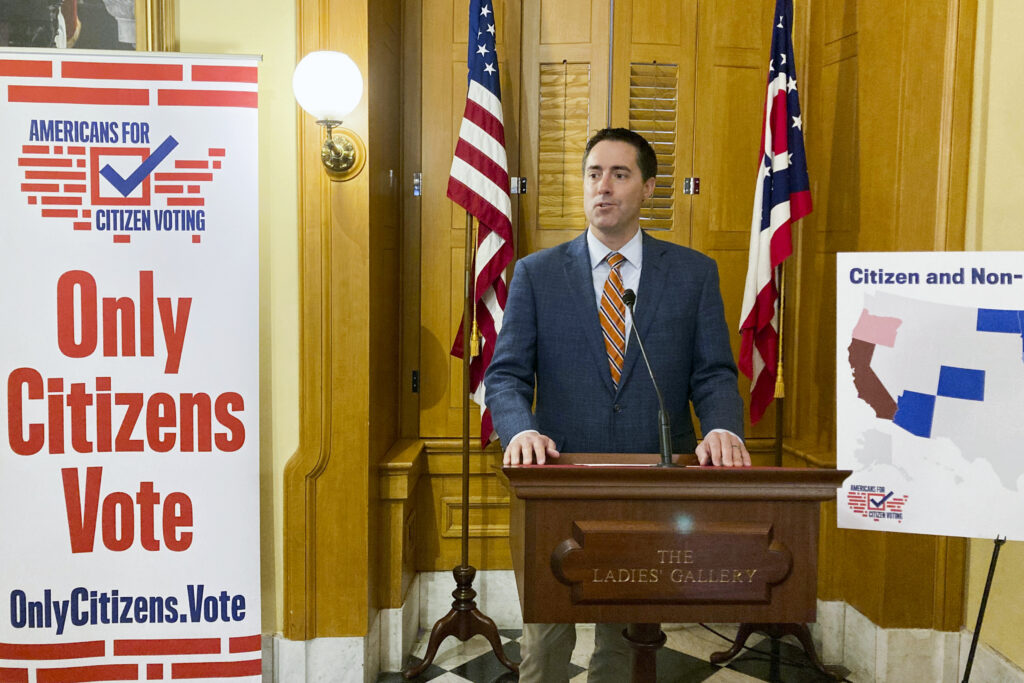Pro-Voting Groups Sue Ohio Over Proof of Citizenship Law as LaRose Lashes Out

Voting rights groups filed suit against Ohio Friday, warning that a new law requiring proof of citizenship for voters registering at the Bureau of Motor Vehicles (BMV) threatens to disenfranchise thousands of eligible citizens.
Red Wine & Blue and the Ohio Alliance for Retired Americans argue that House Bill 54 (HB 54), which quietly passed in March as part of a transportation funding bill, violates the National Voter Registration Act (NVRA) and the U.S. Constitution.
“HB 54’s new proof-of-citizenship requirement imposes unnecessary obligations to register to vote in violation of the NVRA,” the plaintiffs argue. “HB 54 violates the U.S. Constitution because it is impermissibly vague, giving no guidance as to what constitutes sufficient proof of United States citizenship.”
For decades, Ohio voters have been able to register to vote at the BMV by attesting under penalty of perjury that they are U.S. citizens — the same standard used for online, mail-in and agency-based registrations.
HB 54 breaks with that uniform practice, singling out BMV applicants.
The proof of citizenship requirement was added back into a budget bill at the last minute after being briefly stripped out, with little debate. Even State Rep. Brian Stewart (R), Chair of the House Finance Committee, said “we’re not going to require folks to come with proof of citizenship in order to register at the BMV” before the provision resurfaced.
The filing highlights how the law will fall hardest on women, older voters and students.
Many women lack documents that reflect current legal names after marriage or divorce. Seniors may have lost or never obtained citizenship papers, which may be prohibitively expensive to replace. Students often keep important records with family far from campus.
Ohio Republicans framed HB 54 as a safeguard against noncitizen voting. But Secretary of State LaRose’s track record shows that noncitizen voting is practically nonexistent in Ohio.
In 2024, LaRose referred 597 alleged noncitizen voting cases out of nearly six million votes cast to law enforcement. Just six led to indictments.
Even Republican Attorney General Dave Yost downplayed the claims, saying the tiny number of cases “should enable everybody to take a deep breath and be more confident that our elections are, in fact, safe and secure, and the noncitizens are not going to vote.”
In response to the lawsuit, LaRose lashed out at Marc Elias, founder of Democracy Docket and firm chair of the Elias Law Group (ELG), which is representing the plaintiffs in the case. LaRose called the challenge an “activist lawsuit,” and cited a recent ELG lawsuit against Wyoming’s new proof of citizenship law, which was dismissed.
In fact, the judge tossed the case on standing, not on substance.
“The Court has not considered nor makes any comment on the merits of Plaintiffs’ claims,” the judge wrote.
The Ohio plaintiffs asked the court to block enforcement of HB 54, calling it “a solution in search of a problem” that undermines federal protections and imposes needless costs and delays on eligible citizens.
With nearly 30% of Ohioans registering through the BMV, the outcome of the lawsuit could have far-reaching consequences for voting access in one of the nation’s most competitive states.